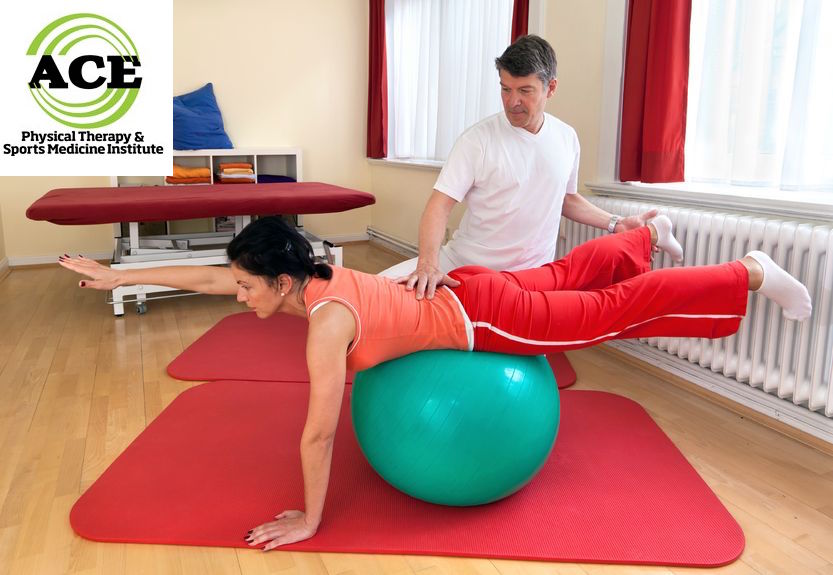FUNCTIONAL MOVEMENT SCREENS AND PHYSICAL THERAPY
Functional Movement Screens and Physical Therapy
by ACE Physical Therapy and Sports Medicine Institute
Tid Bits of Info.
- It has been reported that the four major league sports paid out 1.5 billion dollars to injured athletes.
- People with scores equal to or less than 14 were responsible for up to 85% of the injuries reported.
- The FMS score is directly related to BMI, age and previous injury.
- The FMS score does not predict the level of success that an athlete will have during competition.
- If you are interested in being functionally tested, seek the advice of a Physical Therapist.
Improper movement and movement limitations can lead to injury in fitness training and in on-the-job activity (in sports and other workplaces). Injuries can be costly for the individual and the employer (or the sports team). Physical Therapists are trained to offer expert assessment of potential problems that can lead to injury. They utilize Functional Movement Screen to help identify limitations due to asymmetries, weakness, reduced flexibility or improper movement patterns. Once they diagnose these limitations, Physical Therapist can help develop correction strategies to help avoid injuries.
Movement and Injury
Most injuries occur secondary to poor movement within a body part or parts, and many of these could have been avoided if the person had known that the body was not prepared to make the particular movement that produced the injury in the first place. This is especially true in the workplace or in athletic competition. The cost to rehabilitate an injured worker can run into the thousands and total cost for a company can be astronomical. The cost of worker’s compensation can be one of the largest expenses that a company has to endure. Obviously, if an athlete is hurt the ability to perform at the highest level is reduced significantly. Therefore, it makes sense to evaluate all employees and future employees or athletes for improper movement patterns that might pre-dispose them to an injury.
The Functional Movement Screen (FMS) is a series of test movements that can be assessed by a qualified healthcare provider to determine if the individual being tested has any deficiencies or abnormalities in their movement patterns. The human body is capable of moving in almost any direction and to accomplish the movement without experiencing an injury it must move as unit and not as individual parts. The body is referred to as a series of kinetic chains that must move as one and if there is a weak link, it can lead to abnormality in motion and cause an injury. The key essential to proper motion is balance of motion and stability. The motion within the joints of the body must be controlled by the static and dynamic stabilizing structures. If these structures are not in synch, there is a good possibility of improper movement patterns and the development of an injured body part.
The Functional Movement Screen consists of 7 movements that are designed to test the various movement patterns that the body must be able to perform during most activities of everyday life whether it be at work or play. The movements consist of: Deep squat, Hurdle step, In-line lunge, Shoulder mobility, Active straight leg raise, Trunk stability push up and Rotary stability. Each activity is performed and graded for quality of motion/ movement. The scoring is 1-3 with 3 being a movement done properly and 1 not being done at all. There have been some studies indicating that a score of equal to or less than 14 is an indication that the person is pre-disposed to an injury. The goal of the screen is to develop exercise routines that will help to restore normal movement patterns and eliminate the bad ones.
Physical Therapists utilize functional motions during the evaluation process on a daily basis. They are the best trained healthcare providers to link the objective findings to a person’s functional limitations. They are capable of diagnosing and treating the limitations that exist and prescribing the proper rehabilitation program to eliminate them. Visiting a Physical Therapist to be assessed for movement asymmetries or abnormalities is easy and does not require a visit to your doctor. They are healthcare providers with a great deal of knowledge and training in diagnosing and treatment movement dysfunction. By eliminating the dysfunction and restoring normal movement patterns the body is better prepared to handle the stresses and strains of everyday life.
Functional Movement Screens are a very useful tool to assess one’s movement limitations. These limitations have proven costly to the industrial and athletic world and many of the limitations could be resolved and replaced with proper motions which would reduce the amount of time lost from work or a sport.
Read more articles on our main website blog at: ACE-pt.org/blog
Vist our main website at www.ACE-pt.org


